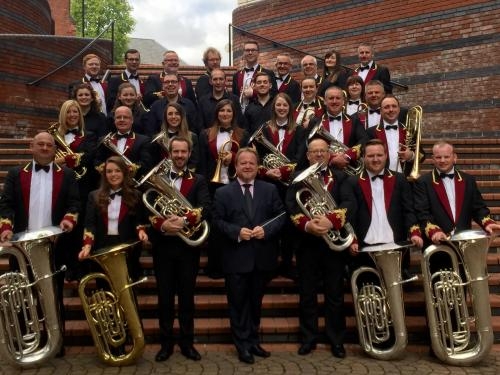Under the spotlight: Kirkintilloch
Friday 25 November 2016
Kirkintilloch Band forms part of the line-up at the 2016 Scottish Open.
THE Kirkintilloch Band is the latest band to go under the spotlight ahead of the 2016 Scottish Open.
Having come close at this contest in the past, the East Dunbartonshire band and conductor Allan Ramsay will be looking to come out on top of the pile at the event, which is supported by Besson, in Perth Concert Hall on November 26.
Principal players
History
The story of the Kirkintilloch Band begins over 120 years ago, at the end of the 19th century. This was a time of great industrial and social upheaval in the area. The town had prospered during the industrial revolution and thanks to the proximity of the Forth & Clyde Canal and good railway links to Glasgow and beyond, Kirkintilloch flourished as a centre for weaving, shipbuilding and iron founding.
Around this time the Temperance movement was very strong in Kirkintilloch; the Reverend William Patrick was a key figure in the Temperance movement – a lifelong abstainer and respected man of the cloth, he helped to form the Kirkintilloch Temperance Union, and the Temperance campaign was so strong in Kirkintilloch that it eventually led to the town becoming ‘dry’ from 1921 to 1968. Around 1890, the Rechabites – a radical and strict wing of the movement, and heavily involved in social reform – decided that a Rechabite Band should be formed.
The town’s Rechabite Band would initially have been intended to provide a means of keeping working men away from the perils of the demon drink, but it would also march around the town and surrounding area and villages, as well as further afield in Glasgow, playing at protest rallies and services extolling the virtues of abstinence. Indeed, the very first public appearance of the Band was at a picnic for the Rechabite Society.
The band began to enter musical competitions as a way of furthering the standard of playing and music-making. The first recorded contest by the Band was on 24th Sep 1898, at the Waverley Market (Edinburgh) Contest, performing as the Kirkintilloch Rechabite Band. The success (or otherwise) of the band at this competition is not known, but the first performance of note came on 29th Apr 1899, in the First Section at the Bellshill Contest, where the band, conducted by a J. Knox, gained 5th place.
As time progressed and the band moved into the early 20th century, it began to extend its musical ambitions and eventually left the Rechabite movement in the early 1900s. The band now started to concentrate on public concerts and the occasional musical competition. In 1905, Ex-Baillie Hudson presented a new bandstand to the burgh of Kirkintilloch, to be situated in Peel Park. This provided a wonderful facility for the now renamed Kirkintilloch Public Band to perform for the people of the town at fetes and celebrations. These were popular occasions and attracted crowds in their hundreds.
The band was taken over by the town council in 1914.
In 1930 the band moved away from being a purely council-supported band to set up independently as the Kirkintilloch Silver Band. However, it wasn’t until the late forties that the Band became seriously involved in competitions, with its first successes coming under conductor Hugh Forbes who eventually led the band to the Third Section title in 1951, playing the test piece Rufford Abbey by Drake Rimmer. This allowed the band to take part in its first National Finals contest at Belle Vue in Manchester later that year – a significant achievement for a band that just a short time previously had only been competing intermittently in the years after the second world war.
After a few years in the Second Section, the band fell back down to the Third, but eventually gained promotion back to the Second Section in 1964, this time conducted by Peter Wilson, who later went on to become the managing editor of “The British Bandsman”.
Success continued and in 1967, under conductor Alex Fleming, the band was promoted to the Championship Section where it came third in 1968. This qualified the band to compete in the British Championships at London’s Royal Albert Hall for the first time, playing Prelude to the Mastersingers. On that occasion the band was conducted by Robert Oughton.
In the early 70s the band appointed David James, then principal trumpet of the BBC Scottish Symphony Orchestra, as its conductor. This was to foster a new period of success, leading to the band winning the BBC Scotland Fanfare Competition two years in succession.
However, it wasn’t until 1984, when the band appointed Professor Walter Hargreaves as musical director, that the first major success was achieved. In March of that year the band finally won the Scottish Championships performing Berlioz’s Waverley Overture, arranged by Howard Snell. This success was repeated the following year when, again conducted by “The Wee Professor”, the band retained its title on Wilfred Heaton’s Contest Music. Since then, the band has won the Scottish Championships a further three times in 1990 (fittingly, the band’s centenary year), 2002 and 2007.
These Championship wins not only enabled the band to compete in the Nationals at the Royal Albert Hall in London, but also meant that the band had the privilege of representing Scotland at the European Championships. The band has been honoured to participate in the Europeans on six occasions, playing in some of Europe’s most iconic venues:
Tivoli Concert Hall, Copenhagen, Denmark 1985;
St. David’s Hall, Cardiff, Wales 1986;
De Doelen, Rotterdam, Netherlands 1991;
Grand Theatre de Luxembourg, Luxembourg City, 1995;
Grieg Hallen, Bergen, Norway 2003
Stavanger Concert Hall, Stavanger, Norway 2008.
In 2001, the band achieved yet another significant milestone with victory at the Grand Shield contest playing Percy Fletcher’s Epic Symphony and conducted by Allan Ramsay. This contest has often been described as the most difficult competition in the world to win, with so many fine bands of such similar quality scrapping it out for victory. However, the band’s wonderful performance on the day stood out from the others and ensured a fine and deserved win. The icing on the cake, of course, was that the victory allowed the band to qualify for the British Open Championships for the first time. This is rightly proclaimed as the most prestigious contest in the world, featuring as it does the cream of the crop of the brass band world. The Kirkintilloch Band is proud to have appeared in this elite competition in 14 successive years and, indeed, to have gained podium finishes on two occasions and five top ten placings.




